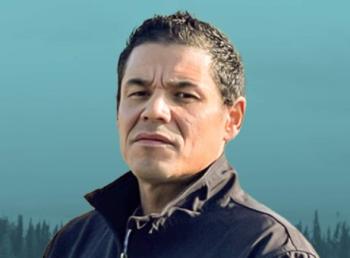Image Caption
Summary
Local Journalism Initiative Reporter
Windspeaker.com
Additionally updated with a statement from Indigenous Services Canada April 26.
Updated with a statement from Alberta's Indigenous Relations:
The Mikisew Cree First Nation in northeastern Alberta has declared a state of emergency.
Approximately eight recent suicide attempts by adults and youth, on top of a couple of adult deaths-by-suicide in the last month, forced chief and council to put a local state of emergency into place April 24.
“We know once we declare we can access more resources,” said Mikisew Cree First Nation Chief Billy-Joe Tuccaro.
He’s hopeful some of those resources will help them understand the causes.
Since becoming chief last October, Tuccaro has had at least 20 different people reach out to him with mental health concerns.
Those concerns increased in February when news of seepages from tailings ponds at the Kearl oilsands site upstream of the community became known. The Imperial Oil-operated facility began having issues with wastewater in May 2022. The lack of information about the seepage and testing results led many to fear contamination of water, land, wildlife and fish.
“A lot of people, they’re really on edge now. I’m pretty sure everybody is going to be accessing…their traditional way of life, and now, knowing they can’t do it? Are they able to eat the fish? Are they able to use the medicines? That’s wearing on people’s minds,” said Tuccaro.
Adding to the angst is the crack cocaine and methamphetamine problems in the community. People are frightened for their own safety and the safety of their children, the chief says.
In February, council adopted a zero-tolerance policy for possession, manufacturing and/or trafficking of illegal drugs. A band council resolution gave leadership the ability to evict those involved with illegal drug activity. Property management has been working with the RCMP to make that happen.
“Recently we did execute a couple evictions for houses that were known to be… places that drugs were being sold out of,” said Tuccaro.
The signs were there: different trucks and people at all hours of the night coming and going.
These are community members that are getting evicted, but Tuccaro says “enough is enough.”
“They were given ample opportunities. February, March, April. Three months. If you can’t realize what you’re doing is wrong, then we’re going to address it for you,” he said.
While the band is responsible for eviction only, the RCMP may press charges if illegal substances are seized or activities noted.
Tuccaro says it’s not his concern where evicted members go. At this point Fort Chipewyan is a fly-in only community with the ice road melting and water access not available for another few weeks.
“We can’t stand by and let these people run the community because we’re too scared about where they’re going to go. If they were so scared about where they were going to go, they wouldn’t be doing the illegal activity,” he said.
Tuccaro says citizens raise concerns, put letters forward, and hold community meetings whenever anxiety peaks, but soon after it’s all forgotten. Until the next time.
That’s the same way governments have dealt with mental health and other issues in communities.
“I want good adequate programs in community for the duration of the people in Fort Chip. Why only when something happens everybody cares then? We should care every day…not (just) when the crisis is happening and everybody’s up in arms,” said Tuccaro.
The nation has reached out to both the federal and provincial governments for funding and resources to support in-community programs and infrastructure.
“What we’re doing, we’re trying to take a short-term approach on what’s going on now, but to work toward a long-term program so this is sustainable,” said Tuccaro. “We need to show our people that we care, that their lives matter to us.”
In a statement, Alberta Indigenous Relations Minister Rick Wilson said he was “deeply concerned” with the situation in the northern First Nation, saying “one death to suicide is too many.”
Wilson said he was committed to working with his provincial and federal government colleagues to “understand what we can do to support” the Mikisew Cree First Nation and all Indigenous communities impacted by loss of life due to suicide.
In an email to Windspeaker.com April 26, Indigenous Services Canada said they were made aware by Mikisew Cree First Nation on April 21 that they planned to declare a state of emergency on April 24.
To that end, ISC had deployed regional mental wellness crisis response services to the community by Monday. Up to three psychologists and a subject matter expert to support administration with their crisis response planning and implementation have been sent.
To date, ISC has made $750,000 available to Athabasca Tribal Council for the 2023-24 fiscal year, which is in addition to their annual budget, to support crisis planning and response activities, including for those in Fort Chipewyan. ISC is awaiting Mikisew Cree First Nation’s work plan to determine what additional support may be required.
“Indigenous Services Canada is deeply concerned about the issues facing the community of Mikisew Cree First Nation,” said spokesperson Zarah Malik.
“Indigenous Services Canada will continue work with the community and all relevant partners to support effective utilization of core funding, identify and fill service gaps, and work on developing a plan to address the issues in the immediate and long term.”
Additional support will continue, said Malik, until the situation has been stabilized and the community informs ISC that help is no longer required.
Never miss a Windspeaker article. Subscribe Today to our new Windspeaker Newsletter!
Local Journalism Initiative Reporters are supported by a financial contribution made by the Government of Canada.

